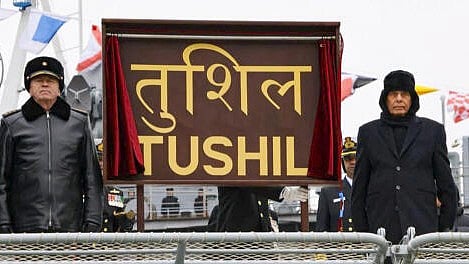
Union Defence Minister Rajnath Singh during the commissioning ceremony of INS Tushil, in Kaliningrad, Russia.
Credit: PTI Photo
New Delhi: India and Russia will work together on new technologies like artificial intelligence, cyber security and space, Defence Minister Rajnath Singh said at Kaliningrad on Monday after the commissioning of Russia-made stealth frigate INS Tushil.
“India and Russia will enter a new era of cooperation by taking advantage of each other’s expertise in areas such as artificial intelligence, cyber security, space exploration and counter-terrorism,” the minister said, noting that existing areas of cooperation would also be strengthened.
Rajnath’s visit for the annual India-Russia Intergovernmental Commission on Military and Military Technical Cooperation comes after Prime Minister Narendra Modi visited Moscow for a bilateral summit with President Vladimir Putin in July and travelled to Kazan in October for the BRICS summit.
In the bilateral talks on defence cooperation to be held on Tuesday, the two sides are likely to take stock of the global geopolitical situation and discuss joint projects.
For decades, Russia was India’s preferred military hardware supplier, but the situation has changed in the recent past with the USA and France emerging as key players in the lucrative Indian defence market.
Even though Russia still remains India’s main arms supplier (accounting for 36% of its imports), 2019-23 is the first five-year period since 1960–64 when deliveries from Russia (or the Soviet Union prior to 1991) make up less than half of India’s arms imports, according to a report from Stockholm International Peace Research Institute.
With New Delhi expanding its engagement with Washington on new technologies, he said India and Russia would realise the full potential of its cooperation in the coming times.
As a first responder in the Indian Ocean region, the Indian Navy was always prepared to provide quick and timely humanitarian assistance and disaster relief to its friends, the defence minister said.
“Our Navy has foiled the designs of piracy, arms and drug smugglers and non-state actors in various hotspots. From the Gulf of Oman to the Gulf of Aden, from Suez to Malacca and from Australia to Madagascar, the Indian Navy is playing the essential role of a net security provider in the IOR,” he said.
“India, along with its friendly countries, believes in ensuring that maritime trade in the region remains safe and secure, thereby promoting unhindered trade across the sea.”
The latest naval acquisition INS Tushil – delivered 11 years after keel laying - is designed for blue water operations across the spectrum of naval warfare in all four dimensions air, surface, underwater and electromagnetic.
“It is armed with a range of advanced weapons, including the jointly-developed Brahmos supersonic cruise missiles, vertically-launched Shtil Surface-to-Air Missiles with enhanced ranges, upgraded medium-range anti-air and surface gun with advanced stealth features, optically-controlled close-range rapid fire gun system, anti-submarine torpedoes and rockets and advanced electronic warfare and communication suite,” an official said.
